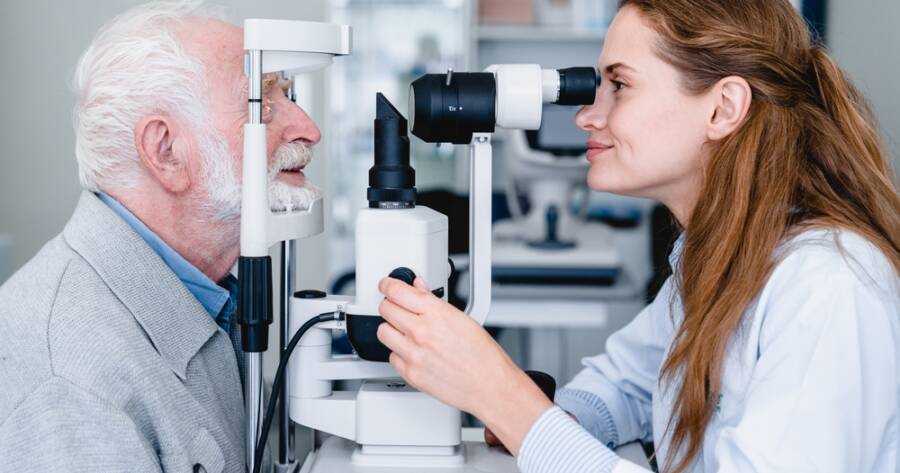Age-related macular degeneration (AMD) stands as a primary contributor to vision impairment among adults aged 60 and older, specifically targeting the macula in the retina. This condition manifests in two primary forms (dry and wet AMD), each presenting unique challenges and varying levels of seriousness. Understanding the underlying causes, consequences, and contemporary approaches for managing AMD can significantly impact quality of life.
Understanding Age-Related Macular Degeneration (AMD)
Age-related macular degeneration (AMD) is a chronic eye disease and a prominent cause of vision loss in adults over 60. It affects the macula, which is responsible for central vision, leaving peripheral vision intact. This condition significantly impacts the quality of life, making activities like reading and recognizing faces challenging for many elderly individuals.
AMD presents in two forms: the more common dry AMD, which accounts for roughly 80-90% of cases and leads to gradual central vision loss, and the less common but more severe wet AMD, characterized by abnormal blood vessels leaking fluid and blood into the macula that causes significant vision disruption.
Causes and Risk Factors
The primary risk factor for AMD is age, with a significant prevalence increase among older age groups. Genetic factors, smoking, and dietary habits also play substantial roles in the development of AMD, which can lead to its onset.
Studies suggest that smoking increases the risk of developing the severe wet form threefold, highlighting the importance of lifestyle changes. Moreover, conditions like high blood pressure and high cholesterol, along with a diet low in antioxidants, can further increase the risk of AMD progression, especially in those already predisposed.
Diagnosis and Monitoring
AMD is diagnosed through symptoms and ophthalmoscopic findings, aided significantly by imaging techniques such as OCT and fluorescein angiography. These techniques are essential in classifying disease stages and monitoring treatment responses. Retinal drusen, yellow deposits under the retina, are early indicators of AMD, and monitoring their presence can aid in early detection and management, providing clues to clinicians. Regular comprehensive eye exams, particularly for individuals with a family history of AMD, are vital for early detection and timely intervention, which significantly improve disease management.
Treatment Options
Treatment for AMD varies depending on its form and severity. For wet AMD, anti-VEGF injections are vital in maintaining vision and reducing retinal edema with clinical success. While these treatments do not cure AMD, they can often halt or even reverse severe vision loss.
Beyond pharmacologic therapies, dry AMD is managed with vitamin and mineral regimens based on the AREDS2 study. These include high-dose vitamins C and E, zinc, lutein, and zeaxanthin, which may slow progression in high-risk individuals, helping to maintain vision.
Lifestyle and Nutritional Management
Lifestyle modifications play a crucial role in managing AMD. Quitting smoking, maintaining a healthy weight, and managing blood pressure and cholesterol can significantly decrease AMD risk by improving overall eye health. Adopting a diet rich in antioxidants, such as leafy greens high in lutein and zeaxanthin, and omega-3 fatty acids from fish like salmon, may also support retinal health and lower AMD risk, providing a natural defense.
Psychosocial Impact and Support
AMD has a pronounced psychosocial impact, often leading to anxiety, depression, and a sense of loss of independence. The condition requires family and social support to assist with daily living and emotional well-being as patients adjust to vision changes.
Vision rehabilitation, utilizing devices like magnifiers and special reading glasses, can also further assist patients in maximizing their remaining vision to maintain activities. Psychological support is equally essential in addressing the mental challenges of vision loss to provide a balanced life.
Why You Should Learn More About Macular Degeneration Today
Macular degeneration, particularly its age-related form, impacts a significant portion of the elderly population, making awareness and management essential. Understanding risk factors, engaging in early detection strategies, and adopting preventive lifestyle modifications can minimize the impact of this condition.
With ongoing advancements in treatment options such as gene therapy and novel drug therapies, along with better management strategies and increased awareness, individuals affected by AMD can lead fulfilling lives. Maintaining regular eye care consultations and staying informed about research developments are crucial steps towards managing AMD effectively and ensuring ongoing quality of life.
Sources
American Family Physician on AMD
Comprehensive Guide to AMD by Dr. Zimm



